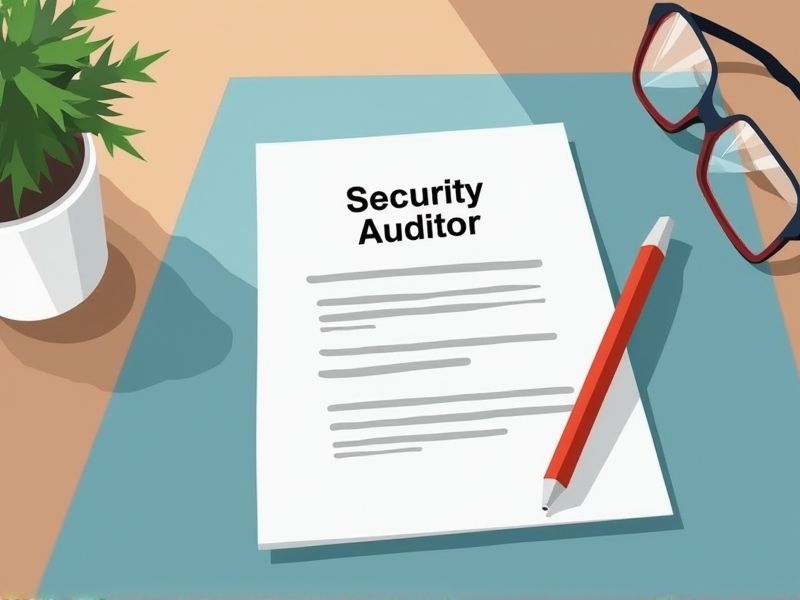
Security auditors play a critical role in safeguarding an organization's information systems and ensuring compliance with regulatory standards. Certifications provide assurance of a professional's proficiency in identifying vulnerabilities and implementing security measures. Having recognized credentials validates expertise and keeps professionals updated on evolving threats and technologies. Below are crucial certifications that a security auditor may require.
Certified Information Systems Auditor (CISA)
Attaining a Certified Information Systems Auditor (CISA) certification equips professionals with internationally recognized expertise in assessing an organization's information systems for vulnerabilities. This certification signifies proficiency in managing IT risk and implementing security controls, which are crucial for a security auditor tasked with protecting sensitive data. CISA holders demonstrate a deep understanding of auditing standards and guidelines, essential for ensuring compliance and maintaining robust security frameworks. Organizations value the CISA as it assures stakeholders of a security auditor's commitment to enhancing and safeguarding their information systems.
Certified Information Systems Security Professional (CISSP)
The CISSP certification equips a security auditor with a comprehensive understanding of information security concepts and practices, enhancing their ability to identify vulnerabilities. It endows auditors with credibility and recognition in the industry, instilling confidence in clients about their expertise. Possessing a CISSP certification ensures the auditor stays informed on the latest security trends and compliance requirements. It also fosters advanced skills in risk management, asset security, and security operations necessary for thorough audits.
Certified Information Security Manager (CISM)
Certified Information Security Manager (CISM) certification provides a deep understanding of risk management, making security auditors more adept at identifying and assessing security threats. This credential ensures that security auditors have the necessary skills to design robust frameworks required for effective information security governance. With proven leadership and management skills, CISM-certified professionals can align security strategies with organizational goals, enhancing overall resilience. Employers tend to prefer CISM-certified individuals because they demonstrate a commitment to ongoing education and adherence to industry standards.
Certified in Risk and Information Systems Control (CRISC)
Achieving CRISC certification equips a Security Auditor with a deep understanding of enterprise IT risks, enabling them to identify vulnerabilities more effectively. Security Auditors with CRISC credentials demonstrate their capability to design protective measures against these risks, thus bolstering organizational defense mechanisms. This certification validates their expertise in aligning IT risk management with business objectives, ensuring that both are in sync. Organizations seeking to mitigate financial and reputational damage value Security Auditors who possess the CRISC certification, given its emphasis on risk assessment and management.
Certified Ethical Hacker (CEH)
Security Auditors require a CEH certification to effectively identify vulnerabilities in a system, using the same tools and techniques that malicious hackers employ. This certification provides essential knowledge for these auditors to anticipate potential threats and develop preventive strategies. CEH training enhances an auditor's understanding of network security and risk management. Organizations value auditors with this credential as it demonstrates a solid grasp of ethical hacking principles, ensuring thorough and reliable security assessments.
GIAC Security Essentials (GSEC)
GIAC Security Essentials (GSEC) provides a foundational understanding of key security concepts necessary for identifying risks and vulnerabilities in IT systems, aiding a Security Auditor's proficiency. The certification emphasizes hands-on skills, equipping auditors with practical approaches to detect and analyze threats effectively. As cyber threats evolve, staying updated through GSEC helps auditors maintain their knowledge base and competencies in real-world scenarios. Organizations often require auditors to hold certifications like GSEC to ensure adherence to industry standards and practices.
CompTIA Security+
CompTIA Security+ provides fundamental knowledge needed for identifying and managing security risks, which is crucial for a security auditor. It covers essential areas like network security, cryptography, and risk management that are critical in evaluating an organization's security posture. Holding this certification can validate an individual's understanding of baseline security practices and policies, making them more competent in auditing procedures. Employers often require or prefer candidates with Security+ since it ensures they have a standardized level of expertise relevant to industry standards.
Offensive Security Certified Professional (OSCP)
The OSCP certification equips security auditors with hands-on penetration testing skills, enabling them to identify vulnerabilities in systems effectively. Many organizations prioritize hiring auditors with OSCP credentials due to the certification's reputation for cultivating practical cybersecurity expertise. The rigorous training and exam process of the OSCP ensures that certified professionals are adept at simulating real-world attack scenarios. Legal and compliance requirements often mandate regular security audits, making OSCP-certified auditors invaluable for maintaining organizational security standards.
Certified Cloud Security Professional (CCSP)
Security auditors require the Certified Cloud Security Professional (CCSP) credential to effectively assess cloud environments due to their complex structures and evolving threats. The CCSP certification provides comprehensive knowledge of best practices and strategies in cloud security, which is critical for evaluating a company's compliance with industry standards. Possessing this credential indicates a deep understanding of architectural concepts and governance, enhancing the auditor's ability to identify vulnerabilities and propose robust solutions. Organizations increasingly demand CCSP-certified professionals, reflecting a growing emphasis on specialized expertise in cloud-specific security measures.
Certified Information Privacy Professional (CIPP)
Security auditors must assess compliance with privacy regulations, and the CIPP certification ensures they possess comprehensive knowledge of data protection laws. Understanding intricacies of privacy frameworks allows auditors to identify gaps and vulnerabilities in systems effectively. CIPP-certified professionals can recommend best practices for data handling, enhancing overall organizational security posture. The certification strengthens the auditor's credibility and trustworthiness in stakeholder communications about privacy matters.
Summary
By obtaining certifications, you enhance your industry credibility and demonstrate a commitment to professional development. Employers often recognize certified security auditors as better qualified, increasing your job opportunities and career advancement potential. Certified professionals generally possess updated knowledge and skills, leading to more effective identification and mitigation of security risks. These improvements can result in increased trust and reliability in your audits, benefiting organizations and clients.
